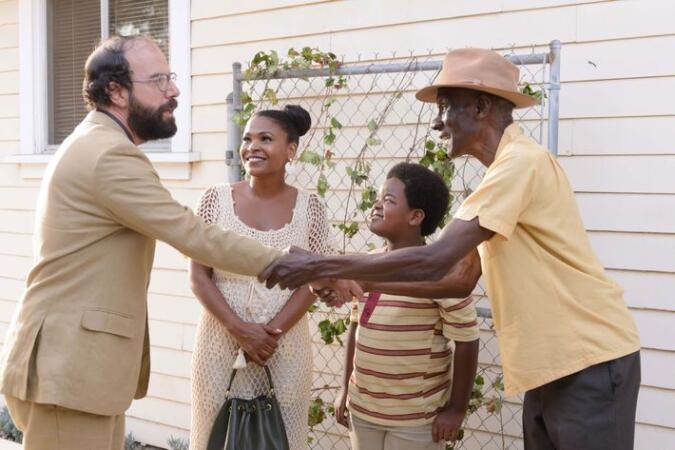As far as experiments go, there’s something to be said for scientists mad enough to consider a novel idea a natural idea. Whether it be exploring inspirations of doubt with someone as assured as her spouse, or plunging a pair of black, woman hands into a story to craft a balding white protagonist in his 40s, Janicza Bravo’s mastery of the absurd extends beyond the world of Lemon into the process in which it was created.
Debuting in theaters and on demand Friday (8/18), written by Bravo and her husband Brett Gelman, yet solely directed by the former, the most tangential parts of Bravo’s personal story become transfixing elements of the one she tells on screen.
Bravo is a black filmmaker married to a white actor. In their collaboration, Gelman plays Issac, a self-absorbed, socially obtuse director, sent spiraling into confusion once his girlfriend leaves him and his favorite actor outgrows him. While none of those circumstances are particular to race, many of Issac’s reactions to feeling betrayed by his passions feel steeped in a sense of entitlement often associated with being white.

“Whiteness is a part of Lemon,” Bravo explains. “It’s a story of privilege. It’s also a story of mediocrity.”
This role reversal wherein a black filmmaker tells a story set in modern-day whiteness, as opposed to Hollywood’s fixation on the inverse, is as successful as it is subversive—a sort of triumph, in Bravo’s case, that doesn’t feel unrelated to the dynamics of race, gender and the different lenses through which folks interpret emotion.
“For me, when I think of Issac, I think in feelings. I know that he’s white, I know that he’s male, but I’m processing him as an individual that is full of feelings that I have had and that I’m afraid of. I don’t want to fail. I don’t want to wake up one day and find out I’m not going to get any of the things I wanted for myself.”
That thought process—that emotional intelligence—is central in storytelling. Functionally, storytellers are sort of creative empaths, tasked with understanding and articulating human emotion. Black women who take that task on as a profession tend to be more suited for the craft than most, as understanding the driving forces of others—men, white folks, non-black people of color—is essential to their survival.
While Lemon is a comedy wherein race and gender are narrative tools but not the story itself, it remains clear the architect of its world is a person emotionally developed by racism and patriarchy.

“When I see Issac,” Bravo contemplates before pausing, “I see shades and texture. Anxiety and worry and stress. As a woman and a person of color, I obviously understand those feelings a lot. They’re a part of my every day. That’s the place I’m working from with all of these characters. It’s not like when I see Nia (Long’s character) I’m like ‘here I am’—I’m all of these people. I’m Judy (Greer’s character), who’s blind, because I also live in limitation and am treated a certain way because people think I’m less than, because I don’t have something they have. Every single person on screen, I’m some version of them, and I process them very much in their feelings and how they’re treated and how they treat people.”
Where black stories told by white filmmakers are often handled as procedures, their subjects stiff and unconscious, films like Lemon, directed by women like Bravo are remarkable exercises in humanity.
And while she maintained the same investment in Long’s character, Cleo, as the rest of the ensemble, this film feels like another addition to the actresses lore as the emotional compass of the movies she’s part of.
At its core, Lemon is a coming-of-age story for inept adults. With Issac’s eyes set on Cleo after being dumped by Ramona, his blind girlfriend played by Greer, it’s hard for one to not think of all the boys who came of age with Long as their picture of romance.
Embodying young love in The Fresh Prince of Bel-Air, Boyz n’ the Hood and Friday, then growing into Love Jones, Soul Food and The Best Man, Long’s acquired glow as an actress emanates romantic maturity—a skill set brilliantly employed in Lemon, as it’s juxtaposed against Issac’s boyish obsession with himself. As always, Long is at her best in this contrast.
Beyond being the soft black girl with deep brown skin and a warmly lit lure, Long often portrays women who are firmly within themselves and capable of managing men and their motives. From standing up to Deebo and inspiring Craig in Friday, to wrangling Will in The Fresh Prince of Bel-Air, to maturing Tre in Boyz n’ the Hood, her foremost ability is to shed light on male fragility.
The way that ability is referenced in Lemon speaks to prolificacy of her acting and the potency of Bravo’s casting—“I have very good taste,” Bravo jokes.
During the best moments of the film, Cleo provides the foundation on which the audience stands to gaze at Issac’s plain desperation, as he’s consumed by the mere idea of her.
Even with entertaining and offbeat performances from Gelman and Michael Cera, who plays Alex, Issac’s friend and acting student, the champions of this film are the black women in front of and behind the camera—proving there are no better captains to navigate the line between fluid expectations and sobering reality.

